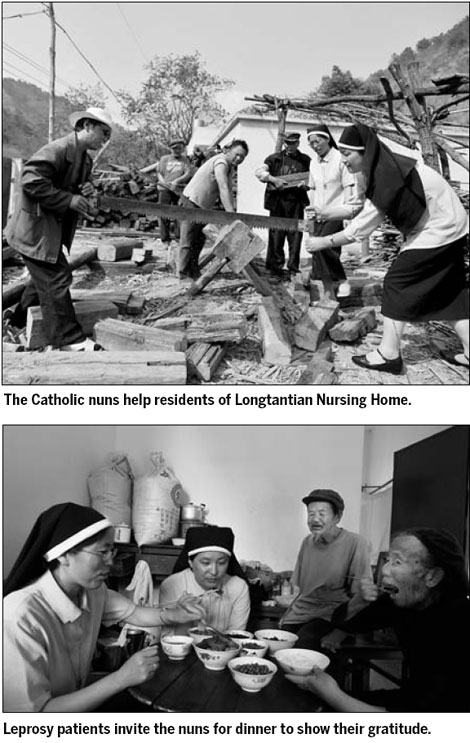Sisters of mercy
 |
|
Catholic nun Han Yuxiu helps an elderly patient with leprosy manicure her fingernails at Longtantian Nursing Home in Yunnan province. [China Daily] |
Everyone they knew, even their families, shunned them - that is, until the four strangers showed up.
A group of 68 people with leprosy at Longtantian Nursing Home sit on chairs to dance arm-in-arm. Their sways are accompanied by boisterous bravos from the four Catholic nuns who care for them in Yunnan province's Honghe Hani Yi autonomous prefecture.
For eight years, these sisters - Han Yuxiu, Zhang Yongzhen, Zhang Ailian and Xu Xiangping - have been restoring dignity to their patients' lives.
The women, who were born to impoverished families in Catholic areas of Gansu province, came to the nursing home through Matteo Ricci Social Service Center under Caritas Internationalis, an international charity organization serving the needy and the abandoned.
After graduating from senior high, they were baptized in Miss. Srs. Oblatae Stae. Familiae, an abbey of German origin in Gansu.
The sisters start their days with prayers and end them by tucking in all of their "kids", who are aged 34 to 86.
But Zhang Yongzhen recalls that it took the residents, who were accustomed to rejection, a long time to accept them.
 |
The 36-year-old says they were greeted upon arrival by shut doors and mouths.
Xu Xiangping, 46, recalls seeing "severe physical pain and a powerful desire for a normal life" in their eyes. But change seemed impossible, as their aching and odiferous pustules stung their bodies and their hearts, because those without their disease didn't want them around.
"One of my educated friends warned me to never go near the nursing home, saying it's a one-way trip," says Wang Ying, a doctor with Jianshui County Maternal and Child Care Service Center, who volunteered to work with the patients last year.
But while the sisters dared to move into the nursing home, the residents dared not truly let them in - at least at first.
"They've been stigmatized by society for so long," Han says.
"To show our sincerity, we wash their ulcers without wearing gloves or masks."
Gradually, most residents have come to open their doors and their hearts to the nuns, and heed their medical advice.
"Like children, they need to be pushed to develop good hygiene," Xu says.
As more patients have gotten their ulcers under control and are no longer shunned outside, they are venturing back into normal lives.
"Some relatives frequent the nursing home and bring the residents their favorite homemade snacks," Wang says.
But the sisters' mission goes beyond treating their disease.
"Our ultimate goal is enabling them to establish a sense of self-reliance and independence," Xu says, choking back tears.
"Otherwise, they'll always be dependent on others."
The patients are very close to one another, and spend their days chatting and playing chess. Many elderly residents who have recovered choose to remain in the nursing home like 72-year-old Liu Aiguo.
"I rushed home after recovery, but being home meant being lonely," says Liu, who has lived at Longtantian for nine years.
"My daughter had to work hard at a factory because of the fierce competition. Even when she's home, I am a total stranger to her world," he continues.
"But I'm more than happy with my old friends in the nursing home. Here, I'm trusted and needed."
The country's 617 nursing homes and villages for people with leprosy host more than 20,000 patients, China Leprosy Association secretary general Pan Chunzhi says.
Some of the stronger residents at Longtantian have reclaimed wasteland to plant vegetable gardens.
Today, the crops these leprosy patients have sown in the earth grow high. And they can do so because the hope the four nuns have sown in the patients' hearts has grown high, too.
 0
0 







Go to Forum >>0 Comments